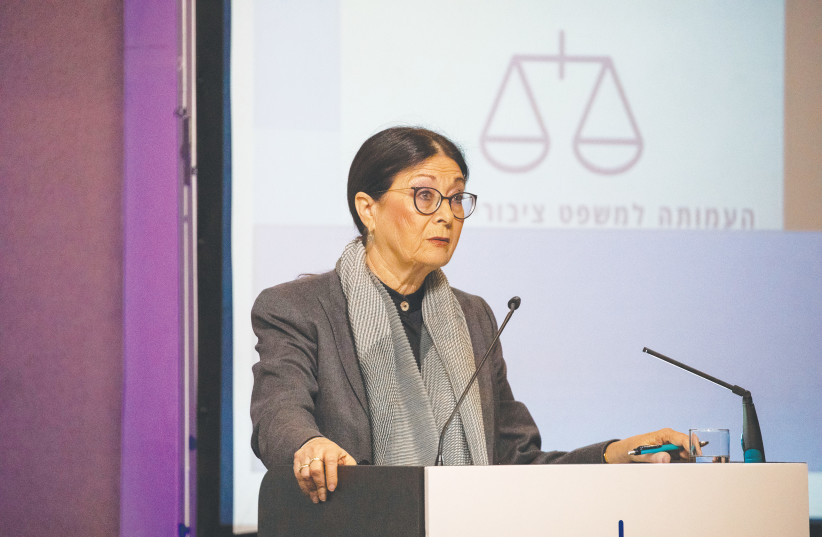The High Court of Justice issued a temporary injunction against the incapacitation law that it wouldn't apply immediately, and a hearing on the injunction will expand the bench to eleven justices, the court spokesperson said on Sunday.
The court order didn't say when the law would come into effect, and until when the order would apply. The move signals that the court is unlikely to strike down the basic law amendment as the petitions demanded, despite the attorney-general’s unprecedented sanctioning of such judicial review.
The court order didn't say when the law would come potentially into effect. The move signals that the court is unlikely to strike down the basic law amendment as the petitions demanded, despite the attorney-general’s unprecedented sanctioning of such judicial review.
A new hearing will be held on September 28. Respondents will have until September 14 to submit arguments that the incapacitation law, which changed the conditions for when a prime minister can be declared unfit for service, shouldn't have delayed application. Petitioners will have until September 20 to submit their own arguments.
The bench was expanded to eleven from the three justices that presided over the incapacitation law hearing on Thursday.
High Court President Esther Hayut, Vice President Uzi Vogelman, and Justice Yitzhak Amit had heard arguments for striking down the incapacitation law over it being a personal law that abused the Knesset's constitutional authority to improve Prime Minister Benjamin Netanyahu's legal situation.

MQG claims amendment was passed to help Netanyahu
The Movement for Quality Government in Israel (MQG), one of the petitioners that claimed that the amendment to one of Israel's quasi-constitutional basic laws had been passed to protect Netanyahu from potential fallout of violating his corruption trial conflict of interest agreement, welcomed the court's decision.
"Regretfully, in the past year personal legislation has become a constant procedure in the Knesset -- which time and time again amends and changes basic laws in order to adapt to the momentary needs of those accused of crimes and convicted criminals," said MQG. "We welcome the decision of the honorable court, which is trying with its meager powers to preserve the democratic rules of the game in Israel while preserving the dignity of the Knesset, which has long since failed to preserve its own dignity."
Yisrael Beytenu MK Oded Forer, another petitioner, wrote on Twitter that “The hasty legislation crudely tailored to Netanyahu's requirements, alongside the insistence on immediate applicability, make it clear that the incapacitation law is a personal law, adapted to Netanyahu's paranoia.”
Hayut had indicated during the hearing that she had accepted the arguments of the petitioners that the law was a deeply personal one, noting that MKs and drafters had explicitly said that they were introducing the law to protect Netanyahu.
Netanyahu had believed rumors, the Attorney-General’s Office representative argued on Thursday, that his boss Gali Baharav-Miara was seeking to declare Netanyahu unfit for office over his conflict of interest agreement violations.
Baharav-Miara had warned Netanyahu at the beginning of the year that his conflict of interest deal had prevented his involvement in the judicial reform.
Key components of the judicial reform included changing the composition and rules of the Judicial Selection Committee and reasonableness standard — which critics said would allow the appointment of judges and a new attorney-general that could influence his ongoing corruption trials.
It was against the 2020 conflict of interest agreement that conditioned his formation of a government for Netanyahu to involve himself in the appointment of judicial, legal, or law enforcement officials.
On March 23, the day that the incapacitation law has been passed, Netanyahu had given a speech announcing his involvement in the judicial reform. Hayut said he had all but said that he believed that the conflict of interest agreement — and an imagined punishment through the incapacitation procedure — no longer applied.
Hayut and Vogelman, however, had said repeatedly that they were missing the connection between the passing of the law and the impact on Netanyahu’s conflict of interest agreement. Hayut had agreed with Knesset legal adviser Yitzhak Beret that regardless of what Netanyahu believed, the law had no evident effect on the conflict of interest agreement.
The incapacitation law was a basic law amendment, and the High Court has never before struck down a basic law amendment. Though the power to do so is debated, and the court believes it can strike basic laws — but it has always exercised caution with this power, seeking alternative options. This includes delayed application, which may remove the personal elements of law.
